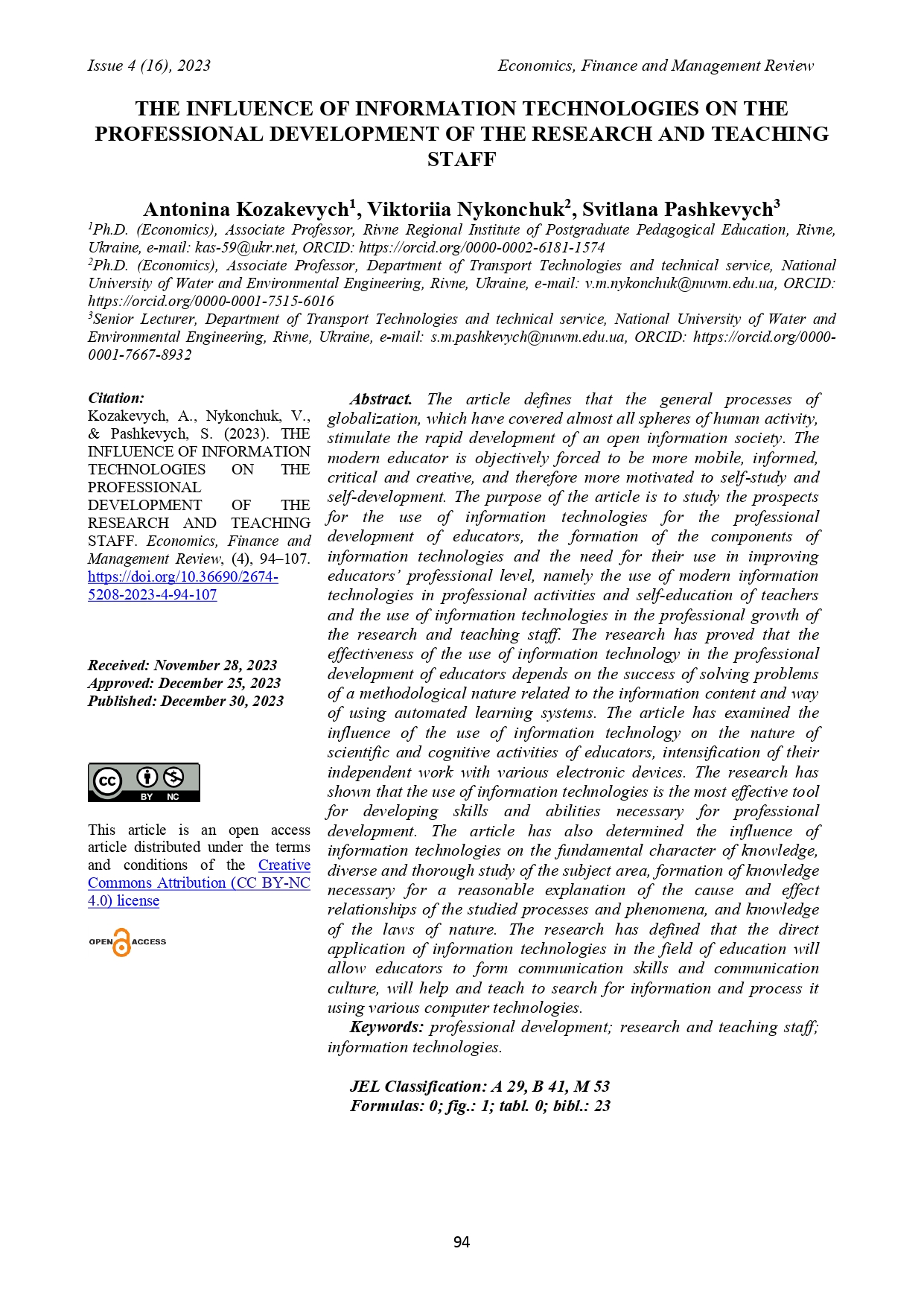THE INFLUENCE OF INFORMATION TECHNOLOGIES ON THE PROFESSIONAL DEVELOPMENT OF THE RESEARCH AND TEACHING STAFF
DOI:
https://doi.org/10.36690/2674-5208-2023-4-94-107Keywords:
professional development, research and teaching staff, information technologiesAbstract
The article defines that the general processes of globalization, which have covered almost all spheres of human activity, stimulate the rapid development of an open information society. The modern educator is objectively forced to be more mobile, informed, critical and creative, and therefore more motivated to self-study and self-development. The purpose of the article is to study the prospects for the use of information technologies for the professional development of educators, the formation of the components of information technologies and the need for their use in improving educators’ professional level, namely the use of modern information technologies in professional activities and self-education of teachers and the use of information technologies in the professional growth of the research and teaching staff. The research has proved that the effectiveness of the use of information technology in the professional development of educators depends on the success of solving problems of a methodological nature related to the information content and way of using automated learning systems. The article has examined the influence of the use of information technology on the nature of scientific and cognitive activities of educators, intensification of their independent work with various electronic devices. The research has shown that the use of information technologies is the most effective tool for developing skills and abilities necessary for professional development. The article has also determined the influence of information technologies on the fundamental character of knowledge, diverse and thorough study of the subject area, formation of knowledge necessary for a reasonable explanation of the cause and effect relationships of the studied processes and phenomena, and knowledge of the laws of nature. The research has defined that the direct application of information technologies in the field of education will allow educators to form communication skills and communication culture, will help and teach to search for information and process it using various computer technologies.
Downloads
References
Abdalova, O.: The use of e-learning technologies in the educational process. Distant and virtual education 12, 50 - 55 (2014).
Varenko, V.: The use of the latest information technologies in the training of document specialists. Bulletin of the Book chamber 5, 1 – 2 (2011).
Vozniuk, O.: The concept of the teacher’s personality as a model of productive professional activity. In: Acme-achievements of scientists of Zhytomyr scientific and pedagogical school, 107 - 134. Zhytomyr State University publishing house, Zhytomyr (2016).
Hurmaza, V.: Modern information technologies for training future specialists. http://intkonf.org/gurmaza-vv-suchasni-informatsiyni-tehnologiyipidgotovki-maybutnih-fahivtsiv/.
Zhaldak, M.: Pedagogical potential of computer-oriented learning systems. In: New education technologies 6 - 12. NMC VO, Kyiv (2004).
Zhuk, Yu.: System features of the educational environment as an object of informatization. Postgraduate education in Ukraine 2, 35-37 (2002).
Information technologies. https://uk.wikpedia.org/ wiki/Інформаційні_технології
Information network technologies ІТ. https://dt.ua/ ЕСОNОМICS/infomatsiyn_merezhevi_tehnologiyi_vnautsi_ta_osviti.htmli
Encyclopedia of education. Yurincom Inter, Kyiv (2008).
Kyrylenko, H.: Applied aspects of the use of information monitoring in the system of training document specialists. Library science. Documentation. Informology 2,65 - 68 (2012).
The concept of introducing media education in Ukraine. Institute of Social and Political Psychology of the National Academy of Pedagogical Sciences of Ukraine. http://www.ispp.org.ua/news_44.htm
Melamud, V.: Features, some directions and trends in the use of information technology in modern education. World of psychology 2(38), 242 – 243 (2006).
Nikitin, E.: Life dictates conditions. School 3, 5 (1998).
Trindade, A.: Information and communication technologies and development of human resources. Distant education 2, 5 - 9 (2002).
Papernova, T.: Formation of ICT competence of a teacher in the system of continuing education. Materials of the Internet conferences. https://www. Sworldcom.ua/ index.php/ru/ pedagogy-311 /7 417
Stefanenko, P.: Didactic features of distance learning in higher education. Pedagogy and psychology of professional education 1, 22 - 32 (2004).
Hamburg Declaration on Adult Learning. The Fifth International Conference on Adult Education. Hamburg. http://www.unesco.org/education/uie/confintea/declaeng.htm
Filipova, Ya.: Areas of application of Internet technologies and services in the education system in the specialty “Documentation and information activities”. Library science. Documentation. Informology 3, 48 - 51 (2011).
Filipova, Ya.: Professional competence of the specialists in documentary communications: educational aspect. Bulletin of the Book chamber 1, 25 - 28 (2009).
Filipova, Ya.: Promising specialty in the training of specialists in the information and documentary sphere of Ukraine. Bulletin of the Book chamber 10, 29 - 31 (2003).
Formation of ICT competence of a teacher in the system of continuing education. https://revolution.allbest.ru/ pedagogics/00884212_html
Shelestova, A.: Basic functions of educational documents in the system of electronic-documentary communication of a modern higher educational institution of Ukraine. Library bulletin 1, 43 - 51 (2011).
Sazonets, O., Nykonchuk, V., & Kozakevych, A. The influence of intellectual capital and innovations on the economic development of the world and national economy. Economic Annals-XXI, 190(5-6(2)), 23-32. doi: https://doi.org/10.21003/ea.V190-03 (2021).

Downloads
Published
How to Cite
Issue
Section
License

This work is licensed under a Creative Commons Attribution-NonCommercial 4.0 International License.








